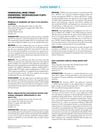Neovascularization During Healing of Wounds Treated with Dermal Substitutes and Fibrin Glue in Nude Mice
August 2004
in “
Journal of the American College of Surgeons
”
neovascularization dermal substitutes fibrin glue full-thickness skin wounds Integra Alloderm acellular dermal matrix ADM Dermalogen Dermagraft human keratinocytes KC laminin endoglin granulation vascularity dermal regeneration reepithelialization fibrin glue Integra Alloderm ADM Dermalogen Dermagraft human keratinocytes laminin endoglin

TLDR Dermagraft and Dermalogen had a lot of granulation, while Alloderm, Integra, and ADM had good blood vessel growth for skin healing.
In the study titled "Neovascularization during healing of wounds treated with dermal substitutes and fibrin glue in nude mice," researchers investigated the neovascularization, or the formation of new blood vessels, in full-thickness skin wounds on nude mice that had been implanted with various dermal substitutes. The substitutes included Integra, Alloderm, acellular dermal matrix (ADM), Dermalogen, Dermagraft, and combinations with fibrin glue (FG) and human keratinocytes (KC). The mice were biopsied weekly for 4 weeks, and immunostaining for laminin and endoglin was used to evaluate blood vessel ingrowth. The results showed that Dermagraft and Dermalogen experienced extensive granulation, Alloderm had limited vascularity which normalized by day 28, and ADM and Integra showed rapid but controlled vessel ingrowth. The study concluded that while Dermagraft and Dermalogen underwent extensive granulation, Alloderm, Integra, and ADM showed progressive vessel ingrowth conducive to dermal regeneration and reepithelialization.




